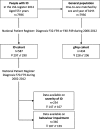Pharmacotherapy for mood and anxiety disorders in older people with intellectual disability in comparison with the general population
- PMID: 31370823
- PMCID: PMC6676521
- DOI: 10.1186/s12888-019-2191-7
Pharmacotherapy for mood and anxiety disorders in older people with intellectual disability in comparison with the general population
Abstract
Background: People with intellectual disability (ID) have high prevalence of psychiatric disorders, but even higher rates of prescription of psychotropic drugs.
Methods: Using Swedish national registers, we identified a group of older people with ID and diagnosis of mood disorders (ICD-10 codes F32-F39) and/or anxiety (ICD-10 code F4) during 2006-2012 (n = 587) and a referent group of people from the general population with the same diagnoses during the same time period (n = 434). For both groups, we collected information on prescription of anxiolytics, hypnotics and sedatives, antidepressants, and GABA-agonists.
Results: Among those with a diagnosis of anxiety, people with ID were more likely than those in the general population to be prescribed anxiolytics (Relative Risk 1.32 [95% Confidence Interval 1.19-1.46]) and GABA-agonists (1.10 [1.08-1.31]). Moreover, among those with anxiety but without mood disorders, ID was associated with increased prescription of antidepressants (1.20 [1.03-1.39]). Within the ID cohort, behaviour impairment and MSP (i.e. moderate, severe, or profound) ID was associated with increased prescription of anxiolytics, both among those with anxiety (1.15 [1.03-1.30] for behaviour impairment and 1.23 [1.10-1.38] for MSP ID) and among those with mood disorders (1.14 [0.97-1.35] for behaviour impairment and 1.26 [1.04-1.52] for MSP ID). Moreover, MSP ID was associated with increased prescription of GABA-agonists among those with anxiety (1.23 [1.10-1.38]).
Conclusions: The excess prescription of anxiolytics but not antidepressants may suggest shortages in the psychiatric health care of older people with intellectual disability and mood and anxiety disorders.
Keywords: Aging; Down syndrome; Drug prescription; Mental retardation; Sedatives.
Conflict of interest statement
The authors declare that they have no competing interests.
Figures
References
-
- McCarron M, Swinburne J, Burke E, McGlinchey E, Carroll R, McCallion P. Patterns of multimorbidity in an older population of persons with an intellectual disability: results from the intellectual disability supplement to the Irish longitudinal study on aging (IDS-TILDA) Res Dev Disabil. 2013;34(1):521–527. doi: 10.1016/j.ridd.2012.07.029. - DOI - PubMed
Publication types
MeSH terms
Substances
LinkOut - more resources
Full Text Sources
Medical
Research Materials


